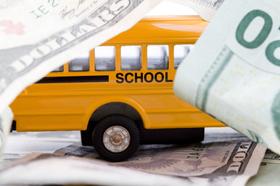With schools across the country facing severe budget cuts due to the current economic slowdown, some are getting creative in their money-raising efforts. As home values plummet and residents are forced to relocate, many school districts are forced to cut their budgets by as much as 10% or more. This means that many schools must choose between cutting funding for much needed supplies and programs and reducing staff.
However, by finding new ways to raise money, from partnering with local churches to selling advertising on school buses, districts are finding ways to get the money they need to provide supplies and staffing to their students.
The Church Connection
Churches have a mission to help people in need. Schools have become quite needy, with severe budget cuts that prohibit them from providing even the basics to their students. It appears that at least one public school in Florida has recognized the connection between the two.
Combee Elementary School in Lakeland, Florida, has been "adopted" by the First Baptist Church at the Mall, according to a recent report on the Wall Street Journal. The local church has stocked a resource room with $5,000 worth of supplies for the school and continues to meet with the school principal to identify additional needs and try to meet them.
In exchange for its financial assistance, the church gains access to families in the community, according to church pastors. Pastor Dave McClamma told the WSJ, "We have inroads into public schools that we have not had before. By befriending the students, we have the opportunity to visit homes and talk to parents about Jesus Christ."
In addition to the well-stocked resource room, the church has catered spaghetti dinners for school events, sends in math and English tutors, and purchases new sneakers for students in need. With an unemployment rate of 12.1% and the fifth-highest rate of suburban poverty in the nation, this community welcomes any help it can get, particularly where the children are involved.
However, not everyone sees the union between churches and schools positively. Harry Parrott, a retired Baptist minister who runs a local chapter of Americans United for Separation of Church and State, told the WSJ, "I have great concerns about churches who see public schools as, well, what shall I say, church membership." Despite concerns, the need seems to override the separation issue for now, as both schools and churches appear to be benefitting from the relationship.
Advertisements and Corporate Sponsorship
Another option for getting much-needed funding is to sell advertising space to local businesses. The Register Citizen in Connecticut has reported on a local high school that is currently considering the idea to increase revenue for the school. A senior at Torrington High School, Ryan Fredriksson, has presented the idea to the Board of Education's Budget Committee and is waiting to see if the plan can gain the board's approval.
According to Fredriksson, the money generated through advertising dollars could help pay for repairs to the school building, as well as offset the cost of food in the cafeteria. Superintendent Christopher Leone likes the idea, and he told the Register Citizen, "Ryan's idea would be a great source of revenue to the school. Colleges across the country are already doing this very thing.”
State lawmakers in Oklahoma have introduced a similar idea, but have not met with the same warm response from educators in their area. Representative Seneca Scott, a Democrat from Tulsa, has filed an amendment to allow school buses to display advertising, according to a report at NewsOn6.com. If the amendment is passed, each school district would have to formulate an advertising board to determine which advertisers would be considered acceptable for this venue.
Many in Oklahoma support the amendment, saying that the advertising would generate much needed dollars in school districts with dire budget predictions. Roger Wright of Jenks Public School District said, "During these very difficult two, three, four years, we know we're in for it in our public schools. This will allow us to generate some alternative revenue to keep our teachers in their classrooms."
Opponents of the idea do not like the idea of commercializing the public school system. The consumer group, Commercial Alert, recently told USA Today that this type of advertising "teaches children they're for sale". Others worry that the colorful advertisements could affect the safety of the students on the buses by distracting the drivers on the road with them. The current proposal for school bus advertising has been voted down, according to the Wall Street Journal.
As budget forecasts continue to look dim, more and more creative ideas may crop up to increase revenue in schools. Partnering with churches and subjecting schools to the influences of advertisers may just be the tip of the iceberg, as schools scramble to provide the best possible education to students, even during tough economic times.















